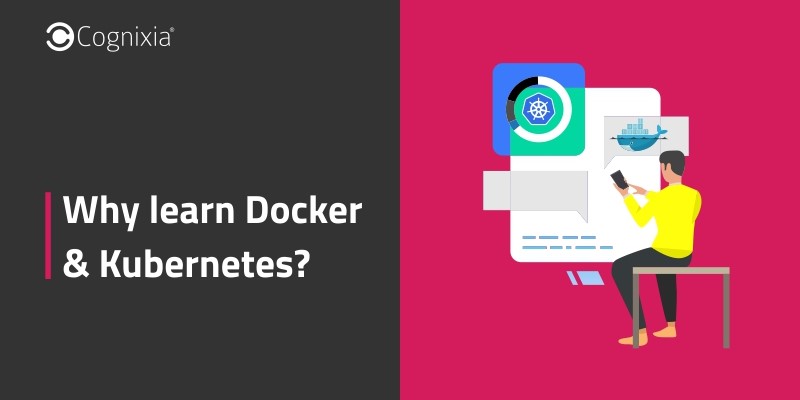Developing applications today is so much more than just writing code. There are multiple languages, frameworks, architectures and discontinuous interfaces between tools for every stage of the lifecycle. This makes the task all the more complex and challenging. Using containers helps simplify and accelerate the workflow, while also giving the developers the liberty to innovate with their choice of tools, application stacks and deployment environments.
Docker is a set of Platform-as-a-Service (PaaS) products that uses Operating System level virtualization to deliver software in containers. Docker is a very popular platform and tool for building, distributing and running containers. Kubernetes is a container orchestration system for Docker containers, meant to coordinate clusters of nodes at scale in production in an effective manner.
Containerized apps use a lot less memory compared to virtual machines, they start up and stop a lot more quickly and they can even be packed considerably more densely on their host hardware.

Today, DevOps is the top priority for many programmers. Docker and Kubernetes are essential these days, not just to improve productivity and build better applications, but also from a scalability perspective and more efficient resource management. Irrespective of whether you are developer, a data scientist, a product engineer, a software engineer, or specialize in anything else, being comfortable with Docker and Kubernetes would get you a long way ahead.
Here are top ten reasons to learn Docker and Kubernetes:
- Docker and Kubernetes are the most popular and commonly deployed tools used for working with containers
- Having a certification in Docker and Kubernetes can enhance your earning potential significantly and make you a sought-after unicorn in the job market.
- Over the past year, the median number of containers per host have doubled to 30, compared to 15 in 2018 and 10 in 2017.
- There is a huge increase in the number of applications being transitioned to cloud-native infrastructure, which needs professionals skilled in Docker and Kubernetes to carry out the requisite processes.
- Kubernetes holds a whopping 77% market share of orchestrators in-use, making it the de-facto container orchestration tool.
- Containerization helps bring in better security for the applications, and security is the need of the hour. It also helps development be more agile, accelerating the development process and release of code.
- Organizations are beginning to invest heavily in Kubernetes-native tools to simplify operation at scale. Among organizations with 1000 hosts or more, over a 47% have adopted Docker.
- Docker is no longer being run as a standalone technology, but a larger containerization strategy is commonly being implemented, which incorporates automated orchestration of workloads, commonly using Docker and Kubernetes.
- In organizations that have adopted Docker and Kubernetes, deployments have increased steadily to the tune of about 75%. At companies that have adopted Docker and Kubernetes, containers have an average lifespan of about two days. So, containers tend to churn out many times faster compared to hosts. Kubernetes enables these lifespans to go even shorter.
- Containers bring about closer collaboration between DevOps and security, especially as containers and Kubernetes help unify infrastructure and security, making it even more attractive for organizations to adopt them
Both Docker and Kubernetes are here to stay and are on its way to be the most in-demand technologies in the market. Mastering these two platforms will not only help you produce better software and applications, but will also help you move ahead in your careers and stand out from the crowd.

Cognixia – world’s leading digital talent transformation company, constantly strives to bring to you the latest training and certification programs to help you move ahead in your career, and acquire the essentials skills in emerging technologies. Our Docker and Kubernetes Boot Camp has the latest curriculum and covers all the important concepts – fundamentals of Docker & Kubernetes, running Kubernetes instances on Minikube, creating and working with Kubernetes clusters, working with resources, creating and modifying workloads, the container ecosystem, etc. which would help learners be fully equipped to build a career in DevOps and Microservices.
To know more, visit Docker and Kubernetes Boot Camp.

